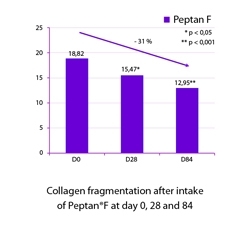09.28.15
The first comprehensive scientific publication of research into the anti-aging benefits of Peptan collagen peptides has just been released. Appearing in the Journal of Cosmetic Dermatology, this latest paper elevates the science behind collagen peptides taken as a supplement for skin beauty to the next level by revealing strong clinical evidence to prove Peptan’s ability to restructure the collagen network in deep skin layers. The newly published data also presents a statistically significant effect of Peptan collagen peptides on skin hydration explained by the stimulation of hyaluronic acid production.
This new compilation of skin health research performed by leading dermatological institutes Laboratory Cosderma and EC Biolab in France and the Souken Laboratory in Japan, features evidence from two double-blind placebo-controlled clinical trials on Asian and Caucasian women with different skin types, backed by further ex vivo studies on skin tissue. The clinical research showed highly important skin anti-aging benefits: Peptan significantly decreased the fragmentation of collagen in the deep layer of the dermis by -18% after 4 weeks and as much as -31% after 12 weeks of intake. Peptan also significantly increased the density of collagen in the dermis by + 9 % after 4 weeks of intake. Skin hydration increased by an impressive 28%, counteracting the appearance of the dry skin that typically occurs through aging. The ex vivo studies demonstrated Peptan’s anti-aging effects from a mechanistic point of view with key findings including the positive impact of Peptan on the skin cell’s (fibroblast’s) ability to produce collagen fibers and glycosaminoglycans (GAGs) such as the moisture-trapping hyaluronic acid.
Commenting on the published data, Dr. Jérôme Asserin of Laboratory COSDERMA said: “At COSDERMA we are specialized in the analysis of safety and efficacy of ingredients for the skin, ensuring a high level of scientific research quality and independence of the studies. The actual results for women who took the collagen peptide supplement show a real effect on restructuring the collagen network by decreasing fragmentation.”
Dr Elian Lati of the BIO-EC Laboratory added: “The results delivered by Peptan collagen peptides within the skin tissue were real: there is a particularly high stimulation of GAGs such as hyaluronic acid. The ex vivo study provided important insights into the mechanisms of collagen peptides on tissue level which provide the basis for its skin anti-aging effects”.
The Journal of Cosmetic Dermatology’s review provides the first ever publication of data to show skin restructuring effects after taking a nutraceutical ingredient. These data are substantiated by a high level of scientific research and the only results to date to demonstrate the underlying mechanism of how collagen peptides help strengthen and rejuvenate the deeper skin layers and maintain the cohesive and dense collagen network that is key to prevent wrinkles and sagging.
For more information: www.rousselot.com
This new compilation of skin health research performed by leading dermatological institutes Laboratory Cosderma and EC Biolab in France and the Souken Laboratory in Japan, features evidence from two double-blind placebo-controlled clinical trials on Asian and Caucasian women with different skin types, backed by further ex vivo studies on skin tissue. The clinical research showed highly important skin anti-aging benefits: Peptan significantly decreased the fragmentation of collagen in the deep layer of the dermis by -18% after 4 weeks and as much as -31% after 12 weeks of intake. Peptan also significantly increased the density of collagen in the dermis by + 9 % after 4 weeks of intake. Skin hydration increased by an impressive 28%, counteracting the appearance of the dry skin that typically occurs through aging. The ex vivo studies demonstrated Peptan’s anti-aging effects from a mechanistic point of view with key findings including the positive impact of Peptan on the skin cell’s (fibroblast’s) ability to produce collagen fibers and glycosaminoglycans (GAGs) such as the moisture-trapping hyaluronic acid.
Commenting on the published data, Dr. Jérôme Asserin of Laboratory COSDERMA said: “At COSDERMA we are specialized in the analysis of safety and efficacy of ingredients for the skin, ensuring a high level of scientific research quality and independence of the studies. The actual results for women who took the collagen peptide supplement show a real effect on restructuring the collagen network by decreasing fragmentation.”
Dr Elian Lati of the BIO-EC Laboratory added: “The results delivered by Peptan collagen peptides within the skin tissue were real: there is a particularly high stimulation of GAGs such as hyaluronic acid. The ex vivo study provided important insights into the mechanisms of collagen peptides on tissue level which provide the basis for its skin anti-aging effects”.
The Journal of Cosmetic Dermatology’s review provides the first ever publication of data to show skin restructuring effects after taking a nutraceutical ingredient. These data are substantiated by a high level of scientific research and the only results to date to demonstrate the underlying mechanism of how collagen peptides help strengthen and rejuvenate the deeper skin layers and maintain the cohesive and dense collagen network that is key to prevent wrinkles and sagging.
For more information: www.rousselot.com





















